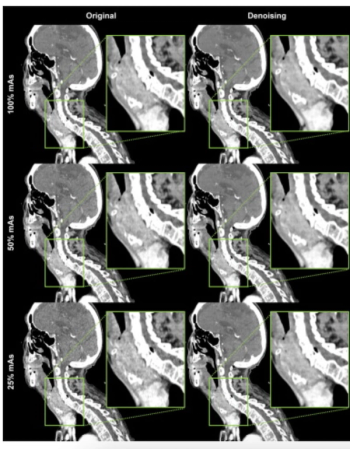
Image quality, sharpness, and contrast with AI-based denoising were significantly enhanced for neck CT in comparison to conventional CT image reconstruction at 100 percent and 50 percent mAs, according to newly published research.
Senior Editor, Diagnostic Imaging

Image quality, sharpness, and contrast with AI-based denoising were significantly enhanced for neck CT in comparison to conventional CT image reconstruction at 100 percent and 50 percent mAs, according to newly published research.

In a study of over 2,000 women with dense breasts and average breast cancer risk, abbreviated MRI (AB-MR) demonstrated an 18.9 per 1000 cancer detection rate (CDR) in baseline exams, and all cancers detected with baseline or subsequent AB/MR exams were stage 0 or 1.
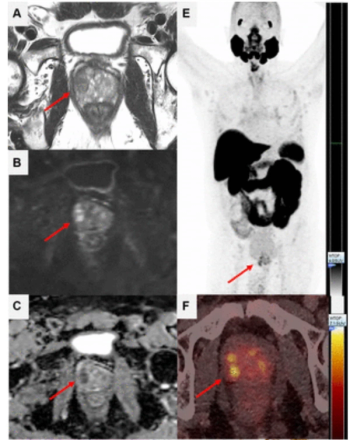
New prospective research examining the utility of 18F-PSMA-1007 PET/CT revealed comparable sensitivity to mpMRI for detecting clinically significant prostate cancer and a 17 percent higher specificity rate.
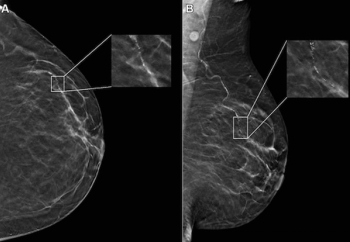
Researchers also noted that mammography-based AI software was associated with over a threefold higher likelihood of false-positive risk scores in patients 61 to 70 years of age in comparison to women 51 to 60 years of age.
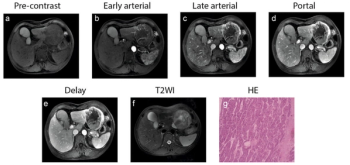
Incorporating dynamic contrast-enhanced MRI, a deep learning model demonstrated a 20 percent higher AUC in external validation testing than clinical factors alone and over a 17 percent higher AUC than radiological factors alone in predicting proliferative hepatocellular carcinoma (HCC).

In recognition of National Women’s Health Month, Dana Bonaminio, MD, Amy Patel, MD, and Stacy Smith-Foley, MD, shared their thoughts and perspectives on the recently updated breast cancer screening recommendations from the United States Preventive Services Task Force (USPSTF).
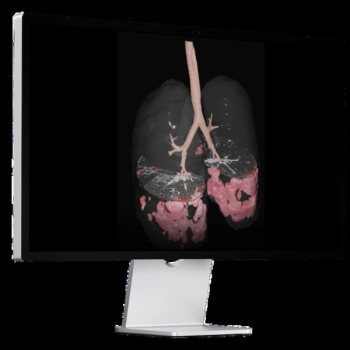
Reportedly trained on thousands of computed tomography scans, the e-Lung software utilizes machine learning to detect and assess the progression of features associated with interstitial lung diseases.
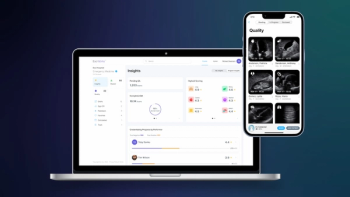
The package of point-of-care ultrasound (POCUS) applications can reportedly facilitate rapid implementation of POCUS into imaging workflows.
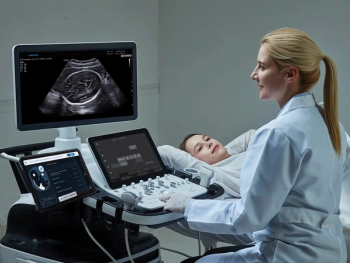
The second version of the device reportedly detects T2/T3 fetal ultrasound views with 93.7 percent sensitivity and enables 63 percent of AIUM exam protocols without manual annotation.
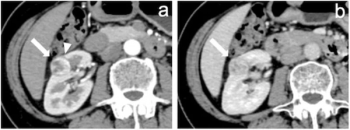
Combining clinical and CT features, adjunctive use of a classification and regression tree (CART) diagnostic model demonstrated AUCs for detecting clear cell renal cell carcinoma (ccRCC) that were 15 to 22 percent higher than unassisted radiologist assessments.
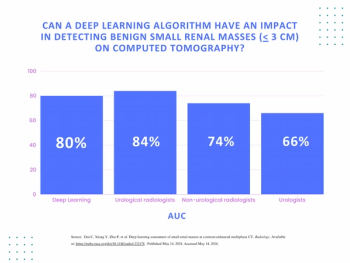
An emerging deep learning algorithm had a lower AUC and sensitivity than urological radiologists for differentiating between small renal masses on computed tomography (CT) scans but had a 21 percent higher sensitivity rate than non-urological radiologists, according to new research.
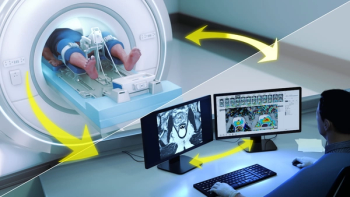
The artificial intelligence (AI)-powered module provides a prostate segmentation tool for MRI-guided transurethral ultrasound ablation (TULSA) procedures in patients with prostate cancer.
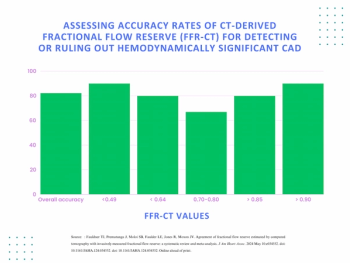
While acknowledging variable accuracy overall with CT-derived fractional flow reserve (FFR-CT) values, researchers found that the accuracy rate increased to 90 percent for FFR-CT values greater > 0.90 and < 0.49.
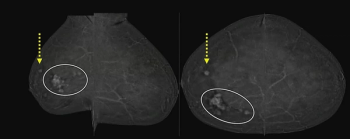
In a recent lecture at the 2024 ARRS Annual Meeting, Jordana Phillips, MD, discussed the role of contrast-enhanced mammography in staging breast cancer, evaluating response to neoadjuvant chemotherapy and recalls from screening.
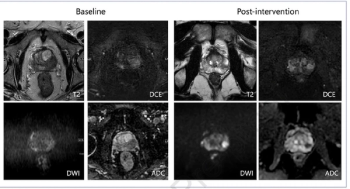
Using a learning network model to discuss challenges and share insights among radiology departments from five different organizations, researchers noted that 87 percent of audited prostate MRI exams had PI-QUAL scores > 4 at the conclusion of the collaborative program.

In a recent interview, Stacy Smith-Foley, M.D., shared her perspective on the shortcomings of the recently issued breast cancer screening recommendations from the United States Preventive Services Task Force (USPSTF).
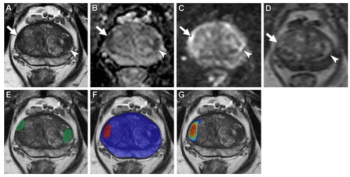
In a study involving over 1,000 visible prostate lesions on biparametric MRI, a deep learning algorithm detected 96 percent of clinically significant prostate cancer (csPCa) in comparison to a 98 percent detection rate for an expert genitourinary radiologist.
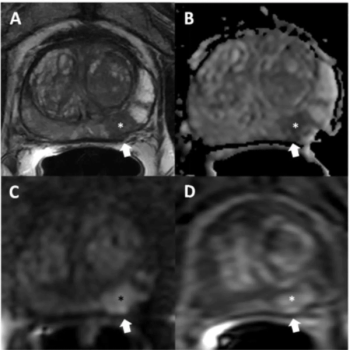
A point-based model that incorporates prostate MRI findings offered a sensitivity rate of 89.5 percent for detecting clinically significant prostate cancer and could prevent over 20 percent of biopsies, according to new research.
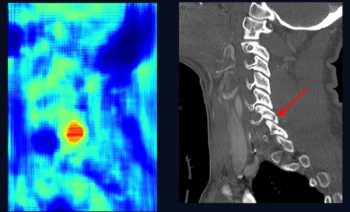
Researchers found a 98.3 percent concordance between attending radiology reports and AI assessments for possible cervical spine fractures on CT, according to new research presented at the 2024 ARRS Annual Meeting.

Reportedly validated in more than 10 clinical trials, the AngioFlow perfusion imaging software enables timely identification of brain regions with cerebral blood flow reduction and those with significant hypoperfusion.
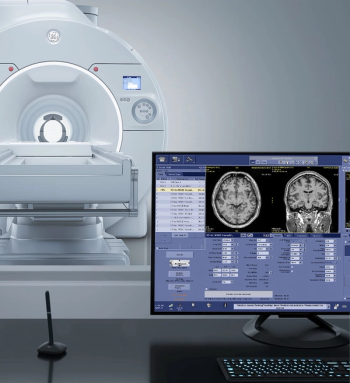
For neuroradiologists, the Signa Magnus 3T MRI system may offer enhanced visualization of the brain microstructure, microvasculature, and function.

The presence of fat-enlarged axillary lymph nodes on mammography screening exams is associated with a fourfold higher risk of type 2 diabetes and a 2.6-fold higher risk for cardiovascular disease, according to new research presented at the ARRS Annual Meeting.
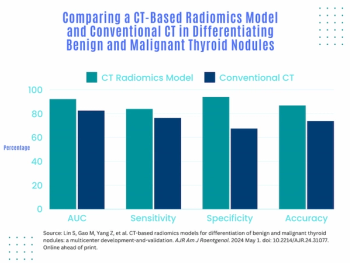
A computed tomography (CT)-based radiomics model that includes 28 radiomic features showed significantly higher accuracy, sensitivity, and specificity than conventional CT in differentiating benign and malignant thyroid nodules, according to newly published research.
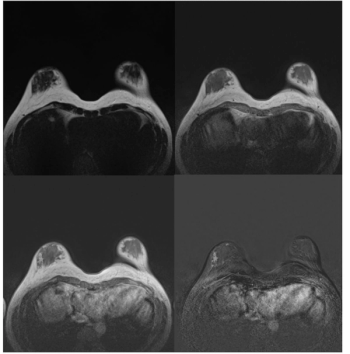
Supplemental breast MRI had a cancer detection rate (CDR) of 20/1000 and a positive predictive value (PPV) of 50 percent, according to preliminary findings from a prospective trial involving women with heterogeneously or very dense breasts.
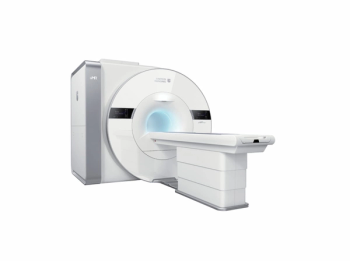
In addition to enhanced resolution, the uMR Jupiter 5T device reportedly addresses image uniformity and radiofrequency safety that have been previous challenges with ultra-high-field MRI.
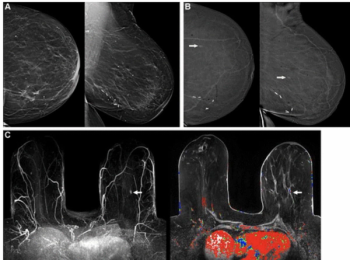
For over 1,200 women with a previous history of breast cancer, interim findings from a prospective trial suggest that adding contrast-enhanced mammography (CEM) to digital breast tomosynthesis (DBT) enhances detection of second malignancies with a limited increase in recalls.
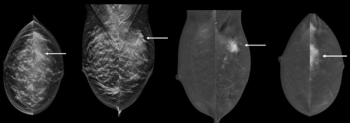
The 10-study meta-analysis demonstrated that contrast-enhanced mammography has a 95 percent sensitivity rate and an 81 percent specificity rate for diagnosing suspicious lesions in women with dense breasts.
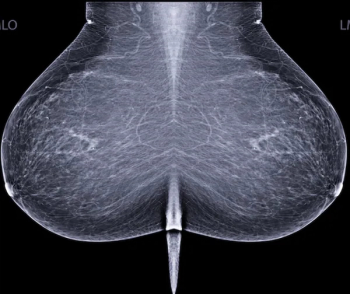
In finalized updates to breast cancer screening recommendations, the United States Preventive Services Task Force (USPSTF) advocates biennial mammography screening for women 40 to 74 years of age and notes insufficient evidence for the use of supplemental MRI in women with dense breasts.

In a recent interview, Steven Raman, M.D., discussed the use of MRI-guided transurethral ultrasound (TULSA) in the treatment of intermediate risk prostate cancer and key research findings with one- and five-year outcomes.
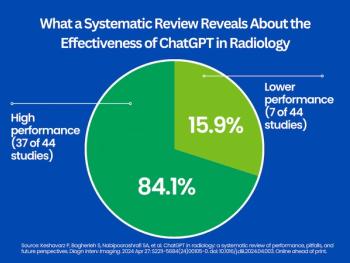
While noting a variety of pitfalls with the chatbot ranging from hallucinations to improper citations, the review authors found the use of ChatGPT in radiology demonstrated “high performance” in 37 out of 44 studies.